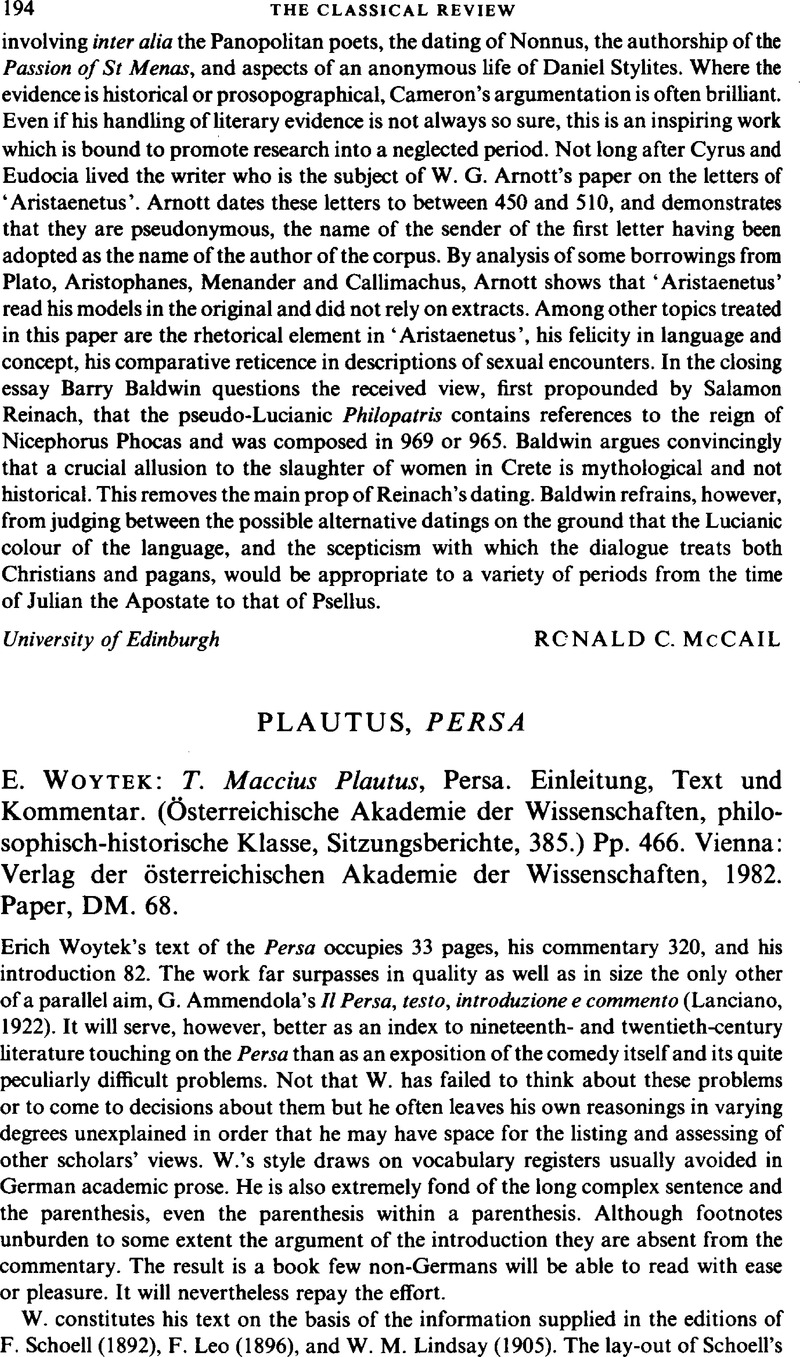Published online by Cambridge University Press: 16 February 2009

1 The parallels offered, Capt. 19, Men1. 480, Persa 784–5, do not show a similar variation of pronouns in asyndetic co-ordinate clauses.
2 Syntactical contamination usually takes place between expressions of broadly similar import. This would not be the case with nescioquid mali consulunt and consulunt quid faciant.
3 This removes a difficulty from Leo's colometry of vv. 797–803. W. should have made it clearer that Lindsay had dealt with a difficulty in his own colometry in a similar way.
4 haec dies summa hodie est means ‘today marks the end of the period’. Comparable is Virg. Aen. 2. 324 uenit summa dies but not Plaut. Asin. 534.
5 W. declares Sagaristio's alleged interjection to be a humorous use of a magistrate's technical term, citing Paul. Fest. p. 353. 9–12, but does not explain the point of the joke. There is no similarity between Toxilus ‘situation and that of a person on trial before a popular assembly.
6 W. does not repeat the defence he offers at WSt 86 (1973), 65–74.
7 quasi birreum would be a tautological way of saying ‘like a birrus’ without a close parallel among the many tautologies of Republican drama. In any case an -eus adjective normally denotes the material from which a thing is made rather than its appearance.
8 This offends both against the early Republican use of commorari (and morari), as W. admits, and against that of apud, whose complement is always in a position of rest (note v. 200: sed quis haec est quae me aduersum incedit?).
9 If taken with contra (cf. Persa 13, Pseud. 156) the pronoun te does not break the pattern of quid agis? jokes. Lindsay should not be saddled with the view that te is the object of astans (at Syntax of Plautus [Oxford, 1907], p. 85 n., such a view of Persa 13 and Pseud. 156 is attributed to ‘some’ and set aside).
10 Sagaristio's normal mode of speech is elegantly witty. The anomalous form hibus appears elsewhere only in the mouth of a personage masquerading as a coarse soldier's servant (Curc. 506; for the ridiculous tone of ibus in the mouth of a soldier at Mil. 74 see Donat. Ter. Eun. 432).
11 Such a name would repeat anti-climactically the joke of the name Argentumexterebronides in the previous verse. Copper is commonly mentioned in the context of small payments and purchases. The disguised Sagaristio was making off with a very large amount of silver.
12 W. appears to have come to his view unaided and then seen that he had been anticipated by Bothe and by Bain, D., Actors and Audience (Oxford, 1977), p. 164Google Scholar n. 1. Bain puts the problems of vv. 605–15 much more pithily and forcefully. I should point out, however, that the words in proelium uide ut ingrediare auspicate fit better with the manner of speech of Toxilus, the manager of the stratagem (see vv. 682, 753–7).
13 On vv. 228–32 see further Woytek's essay in Antidosis. Festschr.f. W. Kraus (Vienna, 1972 [WSt Beiheft 5]), 477–86.
14 Consideration of the oaths of comedy confirms the general validity of the statement about female avoidance of hercle at Gell. 11.6. 1 (probably dependent on one of Varro's). Exceptions like Plaut. Cist. 52 have to be either emended or given a special explanation (cf. Gagner, A., Hercle merhercle ceterisque id genus particulis priscae poesis latinae scaenicae [Greifswald, 1920], pp. 85–88)Google Scholar. They should not be added to by editors.
15 Saturio can only be a coepulonus of a terrestrial Jupiter. Toxilus' Athenian banquets are compared with those held on Olympus. There is no need to bring the tresuiri epulones (Liv. 33. 42. 1) into the discussion of either this passage or the date of the première of the Latin play.
16 Saturio has a daughter. He is not a typical parasitus.
17 The acceptability of rem aliquem cum aliquo orare cannot be deduced from the existence of hoc / quid cum aliquo orare (see the material collected at TLL ix 2. 38–51).
18 This would require the form *sudaculum.
19 The adverb mentioned by Paulus (Fest. p. 84. 23) is prognare, not prognariter. There is no reason to suppose that the source of Paulus' statement is an interpretation of Persa 588.
20 The lengthy attempt in the introduction to show that Sagaristio was represented throughout the play as a pathic homosexual (pp. 45–7) does not convince.
21 See the notes on vv. 60, 73, 178, 421.
22 It is as unnecessary to see a sexual sense in norit here, as it is, for example, in norat at Catull. 3. 6. In any case such a confession of depravity would not suit a free-born citizen, even one like Saturio.
23 On the difference from Mart. 2. 72. 3 see Adams, J. N., The Latin Sexual Vocabulary (London, 1982), p. 212.Google Scholar
24 W. is nevertheless critical of the theories of L. Gurlitt (on vv. 108, 317) and J. M. G. M. Brinkhoff (on v. 803).
25 cf. Plaut, . Asin. 270Google Scholar, Pseud. 139–41, 173–5, 946–8, 1105–8, Stich. 446–8. Cato must have had some reason for his advice about the uilicus: sobrius siet semper; ad cenam nequo eat. (Agr. 5. 2)…parasitum ne quern habeat. (5. 4). It is pure accident that the topic occurs rarely in direct abuse of slaves.
26 W. cites Pollux 4. 120 but not the word Pollux reports for the stick of the stage πορνοβοσκ⋯ς (ἄρεσκος).